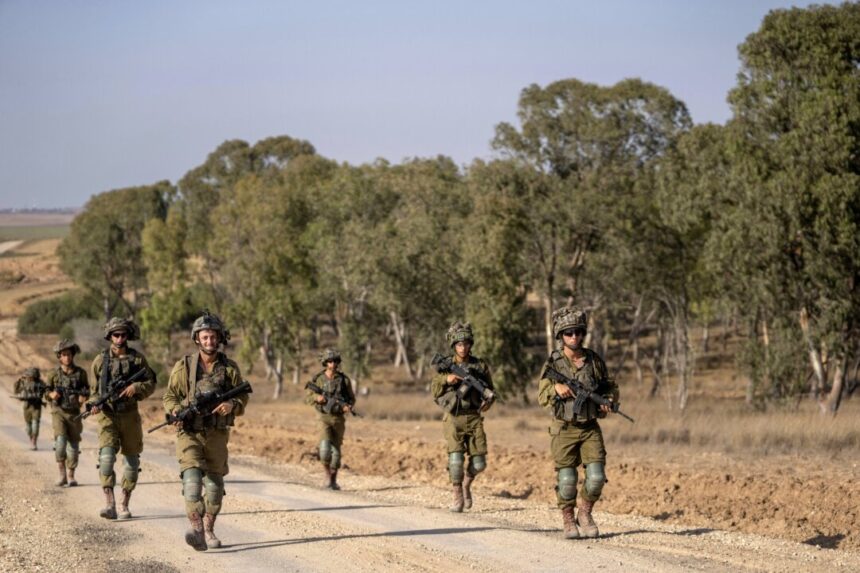Commentary
Years ago I remember seeing a satirical recruitment poster for the U.S. Marines that humorously said: Join the Marines! Travel around the world! Meet new people … and kill them!
A man from Western Canada seems to have taken this concept, in a broad sense, to the extreme.
According to reports from Israel, a
Canadian citizen, potentially from Cold Lake, Alberta, acquired a tourist visa to travel to Israel and carry out a knife attack against the Israeli Defence Forces (IDF) in Netiv Ha’asara, approximately 60 kilometers south of Tel Aviv, near Gaza’s northern border. Unfortunately, he failed to grasp the most important lesson of violence: never bring a knife to a gunfight. IDF soldiers shot him down without harm to themselves or any civilians.
This incident has significant implications for Canada-Israel relations, as I will explain. First and foremost, it is crucial to acknowledge that this is not the first instance of a Canadian citizen leaving to commit a terrorist act abroad. As detailed in my recent book “The Peaceable Kingdom: A History of Terrorism in Canada from Confederation to Present,” Canadian citizens have joined groups like Al Qaeda, ISIS, and Al Shabaab, and have carried out attacks in various countries including Algeria, Somalia, Iraq, and Bangladesh.
Additionally, we narrowly avoided a catastrophe in the past involving terrorism. In December 1999, Ahmed Ressam attempted to enter the United States at the B.C.–Washington border with a car filled with explosives. Known as the “Millennium bomber,” he was en route to Los Angeles’ main airport to launch an attack coinciding with the turn of the 21st century. Thankfully, vigilant U.S. border patrol agents detected his nervous behavior at the crossing and thwarted his plans.
This close call had serious implications for Canada. Sources revealed that the U.S. government cautioned Canada that if Ressam had succeeded, relations would have suffered. This incident prompted a reevaluation in our national security efforts (Ressam had been monitored by the Canadian Security Intelligence Service) and emphasized the need for improvement. It also became a priority to assure our U.S. allies that Canada had no involvement with the Al Qaeda hijackers on 9/11.
Returning to the Alberta assailant.
It would not be surprising if Israel is now posing difficult questions. Was the individual known to CSIS or the RCMP? If so, what intelligence was shared? How did he obtain a tourist visa to Israel (though this responsibility falls on Israel, not Canada)? Who else in Alberta was aware of his intentions? The province is not immune to Islamist extremist ideologies and radicalization (as evidenced by
an attack in Edmonton in 2017 by an ISIS sympathizer, the presence of Islamist extremists in the Edmonton area since the 1990s, and
an Edmonton man recently convicted under the UK’s anti-terrorism laws for supporting Al Mujahiroun). Calgary has faced similar challenges for years.
While the Israeli investigation is ongoing and may provide insight into the deceased terrorist’s motives—depending on any statements or communications he may have made—the use of a tourist visa for entry into Israel could lead to stricter procedures for Canadian visitors in the future. Given that Israel is in conflict with both Hamas and Hezbollah simultaneously, and these groups have followers in Canada, it is essential to recognize the potential risks, as demonstrated by demonstrations supporting these
designated terrorist organizations as “freedom fighters.”
Canada must not appear lenient on this matter. Islamist terrorism poses a threat not only to Israel but to Canada as well, as evidenced by RCMP arrests related to
ISIS plots targeting Jewish sites within our borders. We cannot afford to be a country where our citizens engage in violence abroad (I once heard a senior official dismiss this by saying, “Well, at least it’s not happening here.” This is not a joke). To maintain credibility with our allies, including Israel, we must strive for better.
Furthermore, we require a government that acknowledges jihadism as the primary global terrorist threat, a position it has held for over four decades.
The views expressed in this article are the opinions of the author and do not necessarily reflect the views of The Epoch Times.








